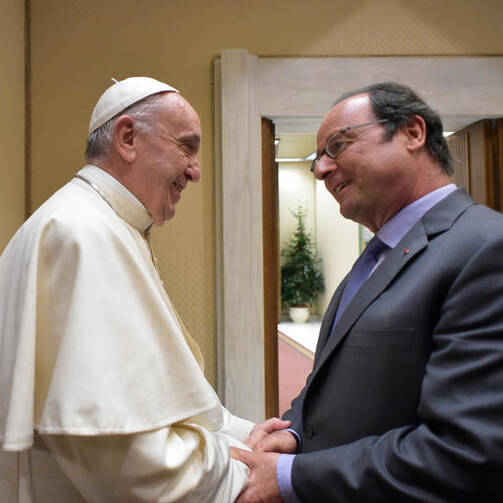President François Hollande of France spoke in private with Pope Francis in the Vatican this afternoon, Aug. 17, at a time of high political tension, widespread fear and insecurity in his country. Brutal terrorist attacks in Paris (November 2015) and Nice (July 2016) killed many people, and last month, an elderly Catholic priest, Father Jacques Hamel, was murdered by Islamic extremists in his church near Rouen.
The Vatican did not reveal the contents of their private conversation but reported in a press communique that the two spoke together for some 40 minutes with the aid of an interpreter, exchanged gifts and afterwards the president met with the Vatican secretary of state, Cardinal Pietro Parolin, and the secretary for relations with states, Archbishop Paul Gallagher.
But based on what the French president said before the meeting and what French officials hinted, it is understood that they spoke about the killing of the priest, the political situation in France, the need to protect Christians in the Middle East and how best to address the issue of refugees and migrants. It is presumed, though there is as yet no confirmation, that the president invited Francis to visit the country.
The two leaders last met on Jan. 24, 2014, when the French leader made an official state visit to the Vatican. This time, however, French media say he came in a less solemn, more low-profile way to speak from his heart to a pope who much prefers this attitude.
Since their first visit, relations have been somewhat frosty between France and the Holy See over three issues. The first predated their meeting: namely, the approval of same-sex marriage in April 2013 by the parliament of this majority Catholic country, once known as “the elder daughter of the church.” The other two points of tension related to the appointment of an ambassador—the Holy See did not give its agreement to President Hollande’s first choice “for political reasons” and not because he was gay as some assert—and French resistance to the pope’s visit to the Central African Republic, one of its former colonies and a place it still has significant economic interests.
Relations have improved, however, between this country of 66 million people—an estimated 65 percent of whom are Catholic and five million are Muslim—and the Holy See over the past months. Cardinal Parolin has visited the Élysée Palace, and France has a new ambassador to the Holy See as of May 2016.
Pope Francis expressed his condolences to the French president after the killings in both Paris and Nice. Then, after the killing of the priest, the French president, who had grown up in Rouen, phoned the pope to express his condolences. Later, on the flight to Poland at the end of July, Francis confided to the press that the president “called me like a brother” after the killing of the priest, and the pope thanked him for that “in a special way.” Hollande had told Francis that “when a priest is attacked, all of France is attacked.”
Today’s visit was a natural follow up to all this, and took place in a positive and constructive climate. Hollande was accompanied by the French interior minister, Bernard Cazeneuve, and the country’s ambassador to the Holy See, Philippe Zeller.
Before going to the Vatican, President Hollande, surrounded by French and Italian security, paid a brief visit to the 16th-century baroque Church of St. Louis of the French (San Luigi dei Francesi) in the historic center of Rome, not far from the Pantheon. He went there to visit the chapel of the crucifix, where some well-known French people who died in Rome are buried and which became a site for prayer for the victims of terrorism after the Nov. 13, 2015, attacks in Paris.
After the visit, speaking to reporters, Hollande expressed gratitude to the pope for his support to the French people after the attacks. He revealed that he intended to speak with Francis about the situations of Christians in the Middle East where both leaders “have a vocation to protect Christians” who play a vital role in maintaining an equilibrium in the region.
Hollande also confided that he wanted to discuss the migrant and refugee crisis with the pope, which call for solutions that are not dominated by fear.
The French president, who was baptized Catholic but is now agnostic, also said he would affirm his government’s responsibility “to protect every religion” and “the freedom [of each person] to believe or not to believe.”
The socialist president then traveled from St. Louis to the Vatican—under extraordinary security measures that included helicopters guarding his every move—for his meeting with the pope.
Pope Francis has said he will visit France, and this is even more likely now after what the French have suffered as a result of the terrorist attacks. But it will probably not happen before the presidential elections in May 2017, in which Hollande is eligible to run for a second term.








